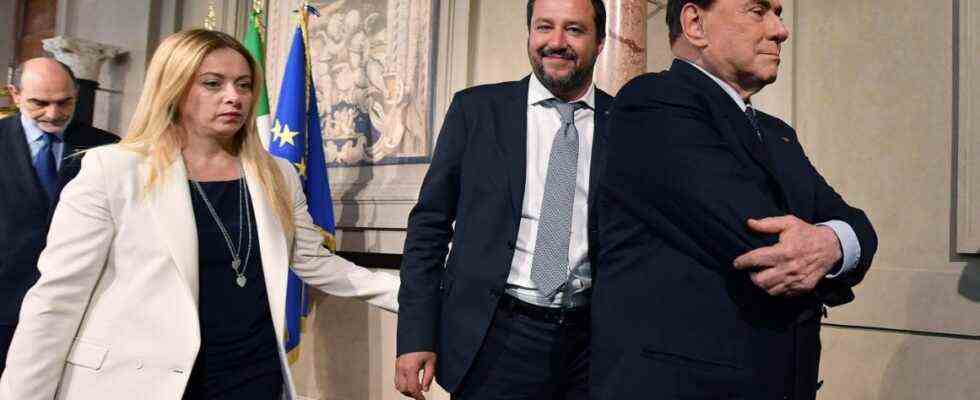Italians are now realizing that status quo is not necessarily the same as standing still. After the re-election of President Sergio Mattarella, which automatically also meant Mario Draghi’s remaining as Prime Minister, two large camps in the Roman Parliament tear each other apart with so much anger and determination that nothing in Italian politics will remain as it was. And since the parliament will have to be reappointed in a year, this sudden dynamic has a certain meaning.
The right camp gets down to business, in the so-called centrodestra, which after a few moults only gets a little more fundamental centro and instead a lot of hard ones destra carries within itself. Its leader Matteo Salvini, head of the right-wing populist Lega, disenchanted himself as a confused and ultimately failed kingmaker in the presidential election. “Now he wants to make the debacle forgotten as quickly as possible,” writes the newspaper Corriere della Sera – with a bold, but no longer completely new plan.
Salvini would like to use his Lega and Silvio Berlusconi’s liberal Forza Italia to form a “Partito Repubblicano” based on the American model. The Republicans are also a gathering place for many conservative souls. Berlusconi originally came up with the idea: he saw it as a chance to save his Forza Italia from oblivion. And now? The weakened Salvini is suddenly not that interesting anymore.
An alliance between Lega and Forza Italia, both governing parties, would ban Giorgia Meloni’s post-fascist and opposition Fratelli d’Italia from the alliance. Meloni would be isolated, far right: catalyst for the dissatisfied in the country. The question is, however, whether the break has already happened. “The Centrodestra no longer exists,” said Meloni, recounting an anecdote from the crucial hours of the presidential election. Early Saturday morning, general confusion. During the night, Salvini proposed making the head of the secret service, Elisabetta Belloni, president. That was also Meloni’s knowledge. Then he calls her: “Are you in your office? I’ll be right up,” he said. Meloni has her office on the sixth floor of Palazzo Montecitorio, seat of the Chamber of Deputies. There are elevators, one or two minutes and you’re there. But Salvini was never to reach the top. Instead, he stood in front of a television camera and explained that the decision had been made to re-elect Mattarella. Meloni then tweeted from her office: “I can’t believe it.”
The two camps also feud in the network
The Cinque Stelle, the big election winners of 2018, are also deeply shattered. Your new one capo politico, Italy’s former Prime Minister Giuseppe Conte, and Foreign Minister Luigi Di Maio, former party leader, are arguing so violently and in public that the newspaper close to the party Il Fatto Quotidiano writes: “Only one will remain.” But who? The two have not understood each other for a long time, neither politically nor personally. Conte now accuses Di Maio of having deliberately sabotaged his work in the presidential election and that he has to answer for it – preferably online, in a survey of registered party members. On Monday, the anger of Conte’s followers also erupted in a shitstorm on social media, it ran under #DiMaioOut.
Conte is said to want to revive the orthodox, rebellious wing of the much-shrunken protest movement and is therefore considering leaving Draghi’s government majority in order to make his mark. Di Maio, on the other hand, is the leader of the “Governisti” in the party, who would rather participate in government than rebel. The “internal guerrilla,” as the newspapers call the struggle, could blow up what is currently the strongest party in the Italian parliament.
The amazing disintegration movement in the party landscape a year before the end of the legislative period brings an old topic back into focus: the debate on the electoral law. Italy gives itself a new one every few years. The current “Rosatellum”, a mix of proportional representation and majority voting, has helped Parliament sail along without majorities since 2018. You saw that in the presidential election. Now there is a great urge to turn back time – far back to the First Republic, from 1946 to 1994, when pure proportional representation gave the small and very small parties disproportionate advantages. Coalitions were not formed before the elections, but afterwards. In small-small, like in the bazaar.

